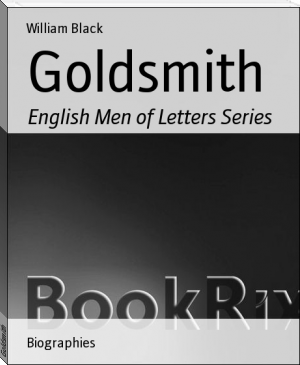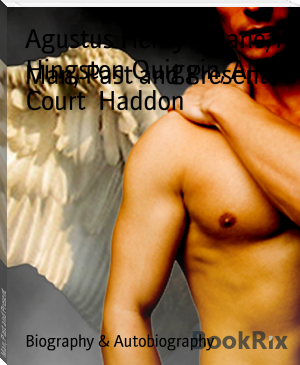Goldsmith by William Black (good books to read for beginners .TXT) 📖

- Author: William Black
Book online «Goldsmith by William Black (good books to read for beginners .TXT) 📖». Author William Black
CHAPTER XV.
OCCASIONAL WRITINGS.
Some two months after the publication of the _Deserted Village_, when its success had been well assured, Goldsmith proposed to himself the relaxation of a little Continental tour; and he was accompanied by three ladies, Mrs. Horneck and her two pretty daughters, who doubtless took more charge of him than he did of them. This Mrs. Horneck, the widow of a certain Captain Horneck, was connected with Reynolds, while Burke was the guardian of the two girls; so that it was natural that they should make the acquaintance of Dr. Goldsmith. A foolish attempt has been made to weave out of the relations supposed to exist between the younger of the girls and Goldsmith an imaginary romance; but there is not the slightest actual foundation for anything of the kind. Indeed the best guide we can have to the friendly and familiar terms on which he stood with regard to the Hornecks and their circle, is the following careless and jocular reply to a chance invitation sent him by the two sisters:--
"Your mandate I got,
You may all go to pot;
Had your senses been right,
You'd have sent before night;
As I hope to be saved,
I put off being shaved;
For I could not make bold,
While the matter was cold,
To meddle in suds,
Or to put on my duds;
So tell Horneck and Nesbitt
And Baker and his bit,
And Kauffman beside,
And the Jessamy bride;
With the rest of the crew,
The Reynoldses two,
Little Comedy's face
And the Captain in lace.
* * * * *
Yet how can I when vext
Thus stray from my text?
Tell each other to rue
Your Devonshire crew,
For sending so late
To one of my state.
But 'tis Reynolds's way
From wisdom to stray,
And Angelica's whim
To be frolic like him.
But, alas! your good worships, how could they be wiser,
When both have been spoiled in to-day's _Advertiser_?"
* * * * *
"The Jessamy Bride" was the pet nickname he had bestowed on the younger Miss Horneck--the heroine of the speculative romance just mentioned; "Little Comedy" was her sister; "the Captain in lace" their brother, who was in the Guards. No doubt Mrs. Horneck and her daughters were very pleased to have with them on this Continental trip so distinguished a person as Dr. Goldsmith; and he must have been very ungrateful if he was not glad to be provided with such charming companions. The story of the sudden envy he displayed of the admiration excited by the two handsome young Englishwomen as they stood at a hotel-window in Lille, is so incredibly foolish that it needs scarcely be repeated here; unless to repeat the warning that, if ever anybody was so dense as not to see the humour of that piece of acting, one had better look with grave suspicion on every one of the stories told about Goldsmith's vanities and absurdities.
Even with such pleasant companions, the trip to Paris was not everything he had hoped. "I find," he wrote to Reynolds from Paris, "that travelling at twenty and at forty are very different things. I set out with all my confirmed habits about me, and can find nothing on the Continent so good as when I formerly left it. One of our chief amusements here is scolding at everything we meet with, and praising every thing and every person we left at home. You may judge therefore whether your name is not frequently bandied at table among us. To tell you the truth, I never thought I could regret your absence so much, as our various mortifications on the road have often taught me to do. I could tell you of disasters and adventures without number, of our lying in barns, and of my being half poisoned with a dish of green peas, of our quarrelling with postilions and being cheated by our landladies, but I reserve all this for a happy hour which I expect to share with you upon my return." The fact is that although Goldsmith had seen a good deal of foreign travel, the manner of his making the grand tour in his youth was not such as to fit him for acting as courier to a party of ladies. However, if they increased his troubles, they also shared them; and in this same letter he bears explicit testimony to the value of their companionship. "I will soon be among you, better pleased with my situation at home than I ever was before. And yet I must say, that if anything could make France pleasant, the very good women with whom I am at present would certainly do it. I could say more about that, but I intend showing them this letter before I send it away." Mrs. Horneck, Little Comedy, the Jessamy Bride, and the Professor of Ancient History at the Royal Academy, all returned to London; the last to resume his round of convivialities at taverns, excursions into regions of more fashionable amusement along with Reynolds, and task-work aimed at the pockets of the booksellers.
It was a happy-go-lucky sort of life. We find him now showing off his fine clothes and his sword and wig at Ranelagh Gardens, and again shut up in his chambers compiling memoirs and histories in hot haste; now the guest of Lord Clare, and figuring at Bath, and again delighting some small domestic circle by his quips and cranks; playing jokes for the amusement of children, and writing comic letters in verse to their elders; everywhere and at all times merry, thoughtless, good-natured. And, of course, we find also his humorous pleasantries being mistaken for blundering stupidity. In perfect good faith Boswell describes how a number of people burst out laughing when Goldsmith publicly complained that he had met Lord Camden at Lord Clare's house in the country, "and he took no more notice of me than if I had been an ordinary man." Goldsmith's claiming to be a very extraordinary person was precisely a stroke of that humorous self-depreciation in which he was continually indulging; and the Jessamy Bride has left it on record that "on many occasions, from the peculiar manner of his humour, and assumed frown of countenance, what was often uttered in jest was mistaken by those who did not know him for earnest." This would appear to have been one of those occasions. The company burst out laughing at Goldsmith's having made a fool of himself; and Johnson was compelled to come to his rescue. "Nay, gentlemen, Dr. Goldsmith is in the right. A nobleman ought to have made up to such a man as Goldsmith; and I think it is much against Lord Camden that he neglected him."
Mention of Lord Clare naturally recalls the _Haunch of Venison_. Goldsmith was particularly happy in writing bright and airy verses; the grace and lightness of his touch has rarely been approached. It must be confessed, however, that in this direction he was somewhat of an Autolycus; unconsidered trifles he freely appropriated; but he committed these thefts with scarcely any concealment, and with the most charming air in the world. In fact some of the snatches of verse which he contributed to the _Bee_ scarcely profess to be anything else than translations, though the originals are not given. But who is likely to complain when we get as the result such a delightful piece of nonsense as the famous Elegy on that Glory of her Sex, Mrs. Mary Blaize, which has been the parent of a vast progeny since Goldsmith's time?
"Good people all, with one accord
Lament for Madam Blaize,
Who never wanted a good word,
From those who spoke her praise.
"The needy seldom passed her door,
And always found her kind;
She freely lent to all the poor,--
Who left a pledge behind.
"She strove the neighbourhood to please,
With manners wondrous winning;
And never followed wicked ways,--
Unless when she was sinning.
"At church, in silks and satins new,
With hoop of monstrous size,
She never slumbered in her pew,--
But when she shut her eyes.
"Her love was sought, I do aver,
By twenty beaux and more;
The king himself has followed her,--
When she has walked before.
"But now her wealth and finery fled,
Her hangers-on cut short all;
The doctors found, when she was dead,--
Her last disorder mortal.
"Let us lament, in sorrow sore,
For Kent Street well may say,
That had she lived a twelvemonth more,--
She had not died to-day."
The _Haunch of Venison_, on the other hand, is a poetical letter of thanks to Lord Clare--an easy, jocular epistle, in which the writer has a cut or two at certain of his literary brethren. Then, as he is looking at the venison, and determining not to send it to any such people as Hiffernan or Higgins, who should step in but our old friend Beau Tibbs, or some one remarkably like him in manner and speech?--





Comments (0)